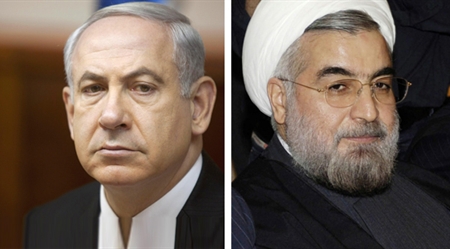This week we have had Iranian President Hassan Rouhani’s not-quite-acknowledgement of the Holocaust, an argument in the US and Iran over whether CNN had mis-translated his words, and Rouhani’s continued refusal to say the H-word — even as the President admitted on Thursday that a “group of Jews” had been killed by the Nazis.
So it may be unsurprising that Israel’s media has served up a large plate of scepticism — with a side order of doubt — about Mahmoud Ahmadinejad’s successor.
Galei Tzahal (Army Radio) said in an op-ed Friday that although Rouhani had initially seemed a welcome change from his predecessor, Mahmoud Ahmadinejad, the “charm had worn off” when he urged Israel to sign the nuclear nonproliferation treaty.
Rouhani, talked quite a bit in recent days, even in English when asked, in a desperate attempt to convince the world that Iran is carrying a message of reconciliation and peace. The record happened during an interview with CNN when he decided to abandon the tradition of his predecessor Ahmadinejad’s Holocaust denial…which immediately won favorable headlines worldwide. But as it turns out, these beautiful words failed to cover up the true reality in Tehran. A few hours later, an Iranian news agency published a notice stating that Rouhani’s words were distorted in translation, and he declared that the Holocaust never occurred. Tehran urged CNN to take responsibility for publishing something incorrectly, despite the fact that the translator was one of the members of the Iranian delegation to the UN General Assembly.
Army Radio continued: “Rouhani’s “charm offensive” continued to subside even after that, in a UN conference on disarmament – when he called to shift the global campaign against Iran, toward Israel.”
Army Radio reminded readers of remarks by Home Front Defense and Communications Minister and security cabinet member Gilad Erdan (Likud), who said earlier this week that he was “more than worried” about Rouhani’s charm offensive.
“Rouhani’s language is having its effect,” Erdan told Army Radio, adding that sanctions had not stopped Iran’s nuclear program. “The centrifuges are spinning faster…There’s also a plutonium core.”
Erdan’s words echoed those of Prime Minister Binyamin Netanyahu, who said that Rouhani’s address to the UN had been a “cynical… hypocritical… PR charade.”
The centrist and populist Ynet also expressed its cynicism and puzzlement about Rouhani in a Friday op-ed, with the headline, “A Salesman In A Cloak — Who Are You, Rouhani?”
Ynet begins, “The “charm offensive” by the Iranian president in New York: Iranian President Hassan Rohani, recently focused attention during the annual UN meeting in New York with his traditional Shiite clothes. He became a shrewd salesman, offering a variety of speeches, tweets, video interviews and carefully planned private meetings. According to the New York Times, “those who watched him closely described Rouhani as serious, restrained and focused on his goal – his message. The new Iranian president wants to convey the message that he is willing to take significant steps to normalize relations with the West, that he is rational, and that he has the support of the Iranian street and the religious establishment in the country – which should determine the future of the nuclear program of the Islamic Republic.”
However, Ynet goes on to say that in reality, Rouhani is not much different from Ahmadinejad. But is he? Ynet appears to be perplexed by the Iranian President:
“In the eyes of strangers, Rouhani seems like some sort of paradox. He dresses himself up in conservative religious garb, but expensive and sophisticated shoes. He prefers to be called Dr. Rouhani, because of his doctorate in law, rather than a religious title. His office uses Twitter to congratulate the Iranian women’s volleyball team and tweeted quotes from his speech at the UN.”
Ynet cannot make up its mind what to think about Rouhani, but does on to note that Rouhani — unlike Ahmadinejad — did not attack the Zionists in his speech, and referred to “Israel” rather than the “Zionist Regime”.
So what of left-leaning Haaretz? Does it offer any meaningful comment on what Israel’s attitude to Rouhani ought to be? Well, no. Haaretz instead seized on yet another opportunity to criticize Netanyahu, with columnist Yossi Werter gleefully writing that the Prime Minister was “flying to New York to spoil the party”.
The day after tomorrow, during the night between Saturday and Sunday, Netanyahu will extend the bed that El Al have installed for him on their airplane — free, no additional cost, emphasizes the Prime Minister’s Office — and before sinking into a sweet sleep, he will consider what his fate should be: a serial wet blanket, or in the words of the most Americanologist Prime Minister we’ve had, a “Party Pooper”.
Netanyahu travels to New York, to the UN General Assembly and to meet President Barack Obama at the White House in Washington, with a burning sense of mission that is not alien to him. Determined to pour cold water, ice water, on the blossoming romance forged between the West led by the United States, with Iran, which is headed by a soft-spoken deceptive leader Hassan Rouhani….
(The rest of the article is behind a paywall, but one can assume it continues in a similar vein.)

